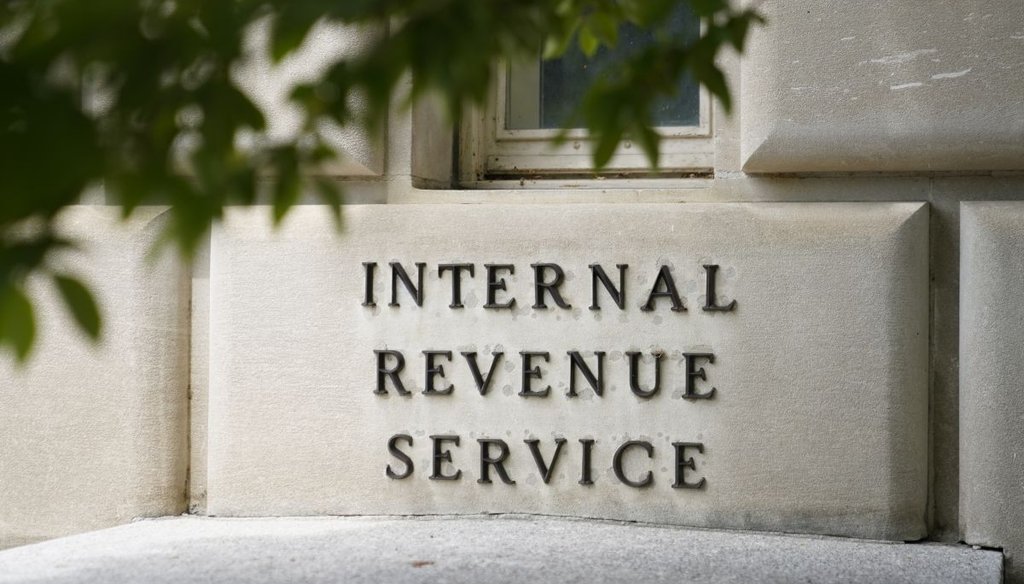Get PolitiFact in your inbox.

(AP)
Fact-checking how much the Inflation Reduction Act affects taxes
If Your Time is short
-
Taxes are poised to rise under the Inflation Reduction Act, which passed in August 2022, but the increases target very large corporations and the richest Americans.
-
These tax increases could be passed along indirectly to taxpayers with more modest incomes. But overall, independent analyses have found that ordinary Americans can expect to see little if any change in what they pay in taxes.
Sen. Joe Manchin, D-W.Va., is up for reelection in 2024, and if he runs for a new term, he faces a difficult reelection campaign in a state that has turned heavily Republican in recent years.
One conservative advocacy group, Americans for Prosperity, took out an ad on Facebook to criticize Manchin for voting to approve the Inflation Reduction Act even though every Republican in Congress voted against the measure.
"The Inflation Reduction Act led to higher taxes," the Americans for Prosperity ad said.
However, this assertion is exaggerated.
As PolitiFact has noted, the Inflation Reduction Act includes a green energy package costing $369 billion over 10 years, including tax credits to boost investment in solar, wind, hydropower and other renewable energy. Such provisions have attracted opposition from oil and natural gas producers, including some in West Virginia, who say it puts their industries at a disadvantage.
The Inflation Reduction Act does not raise income taxes for the broad swath of individual taxpayers; its tax increases are targeted at very large companies and wealthy people. One key provision says corporate profits exceeding $1 billion for three consecutive years will face a new minimum 15% tax on corporate "book income" — generally, the amount of income that companies report to investors.
Although these taxes are poised to hit large corporations and high-income taxpayers directly, "the costs of higher taxes are also borne by the corporations’ workers, consumers, and the economy as a whole," Americans for Prosperity told PolitiFact West Virginia in a statement.
Experts also expect there to be a spillover effect on ordinary taxpayers, because corporations tend to pass the cost of their tax increases: to their customers, through higher taxes; to their workers, through lower wages; and to their shareholders, including retirement plans, through lower dividends.
However, analysts say these spillover effects should be small.
"If you are not in the top 1% of taxpayers, you likely won’t notice any effect of the tax increases included in the law," said John Buhl, a senior communications manager for the Urban Institute-Brookings Institution Tax Policy Center, which analyzes tax issues.
For instance, the Tax Policy Center finds that the average tax increase for the 80% of taxpayers with the lowest incomes "is very small for 2023, a $50 or less reduction in after-tax income," Buhl said.
An analysis by the Tax Foundation, another tax policy-focused think tank, found small but broad gains in after-tax income within every income range measured, once other provisions of the law, including the bill’s energy tax credits and health care subsidies, are factored in.
Nevertheless, some very-high-income earners could see higher tax burdens because of the corporate book minimum tax and other taxes targeted at high-income groups, said Garrett Watson, a senior policy analyst at the Tax Foundation.
Our ruling
Americans for Prosperity said, "The Inflation Reduction Act led to higher taxes."
Taxes are poised to increase under the law, but the increases are targeted at very large corporations and the richest Americans.
These tax increases could be passed indirectly to taxpayers with more modest incomes. But overall, independent analyses have found that ordinary Americans can expect to see little, if any, change in what they pay in taxes.
We rate the statement Mostly False.
Our Sources
Americans for Prosperity, Facebook ad, July 17, 2023
Tax Policy Center, "The Inflation Reduction Act primarily impacts top 1% of taxpayers", accessed Sept. 21, 2023
Tax Foundation, "Details & Analysis of the Inflation Reduction Act Tax Provisions," Aug. 10, 2022
PolitiFact, "Tom Cotton misleads on how Inflation Reduction Act will impact size of IRS, taxes," Aug. 23, 2022
Email interview with John Buhl, senior communications manager for the Urban Institute-Brookings Institution Tax Policy Center, Sept. 20, 2023
Email interview with Garrett Watson, senior tax policy analyst at the Tax Foundation, Sept. 14, 2023
Americans for Prosperity, emailed statement to PolitiFact, Oct. 2, 2023
Browse the Truth-O-Meter
More by Anthony Starkey
Fact-checking how much the Inflation Reduction Act affects taxes
Support independent fact-checking.
Become a member!
In a world of wild talk and fake news, help us stand up for the facts.

























